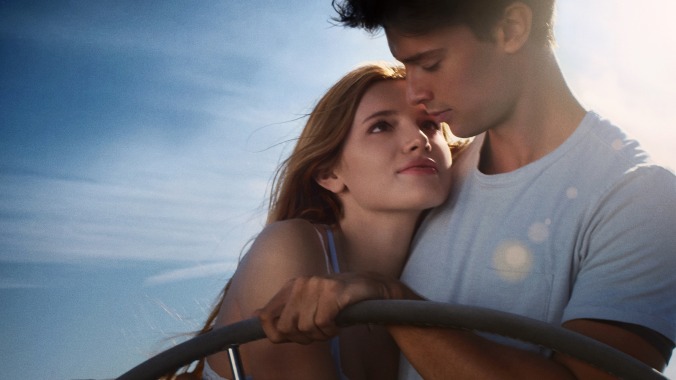The terminally ill romance Midnight Sun won’t so much jerk your tears as bore you to them

The tearjerker formula’s rote eroticization of death—a robotic striptease of freak accidents and terminal illness—is matched only by its blandness, which challenges critics to review the same film at least three or four times a year without repeating themselves. Take Midnight Sun, for example. Here is the crassly calculated story of a young woman, Katie (Bella Thorne), who can’t go out in the sun because she was born with xeroderma pigmentosum. In real life, this is an extremely disfiguring disease that in many cases results in an early death from skin cancer. But thanks to a truckload of dramatic license, Katie suffers only the morbid sentimental interest brought on by her condition and none of the diseasey shit. Her skin is luminously perfect, rather than thick, crusty, and subject to cutaneous malignancies. She sits in her bedroom, which looks like it’s never been slept in, and strums a guitar while she scratches lyrics in her journal. Her music is tunelessly plain-vanilla acoustic stuff, and Midnight Sun makes no attempt to sell it.
The music angle comes straight from the source material, a sappy Japanese movie that was basically a feature-length promo for a singer. But while the songs seem extraneous here, the fact is that without them, the plot of Midnight Sun is basically just a Cinderella story. Every day, Katie watches her hunky neighbor and prince figure, Charlie (Patrick Schwarzenegger, son of Arnold), pass under her tinted window and pines for him. Having lived their whole lives in the same small Pacific Northwest town, the two finally meet at a quaint train station, where she leaves behind her journal like a glass slipper. He woos her while she evades questions about her life, making excuses for why she can only come out at night while still trying to abide by the strict curfew set by her photographer dad (Rob Riggle). In a movie like this, jobs are only meant to show that characters are “authentic” (which they ironically aren’t), to relate them to dim cultural nostalgia. So Katie’s dad takes black-and-white photos on roll film and Charlie fixes boats at the town harbor. He even drives a Ford F100, one of America’s certified romance trucks.
All in all, Charlie seems like a decent dude, and when his voice hits low notes, he sounds uncannily like the elder Schwarzenegger minus the Austrian accent, which is a trip. He takes Katie out on a date in Seattle (actually Vancouver with a stock shot of the Space Needle), brings her to a show by a dismal band, and later even buys her studio time to record a song. The workmanlike direction of Scott Speers (Step Up Revolution) barely recognizes the film’s fairy-tale logic. That’s part of the problem with tearjerkers like Midnight Sun: They’re about as romantic as an ad for a state tourism board or a poem printed in a greeting card. This isn’t the escapism of majestic crane shots and syrupy strings. It just looks like commercial photography, a lot of couples on beaches and weathered wood planking and big moments edited in montage. Whether the film is a Nicholas Sparks adaptation or an ersatz Sparks-alike like Midnight Sun, the mise-en-scène is the same pseudo-picturesque bilge. Nobody in these movies looks like they dressed themselves.
Which means that it all comes down to quality of presentation, i.e., how well the film sells its fucked-up ideas about mortality. The authentic Sparks movies at least tend to be howlers, with shamelessly overcomplicated narratives and risible twists. Midnight Sun, on the other hand, is straightforward and trite. When Katie enters the inevitable terminal phase that is this story’s version of fading magic, her declining health results only in a switch to paler make-up and nude lipstick, like Target’s idea of heroin chic. There’s something amusing about seeing almost pornographically morose themes handled with squeamishness and obsessive cleanliness—a film about teenage romance and slow death that never acknowledges that anything happens with the human body. It’s more or less sexless, capped off at moderately passionate kissing. Which, in a funny way, betrays what it really is: One long tease for the moment viewers can dribble some bodily fluids and get off on the general sadness of death. Different strokes, as they say.